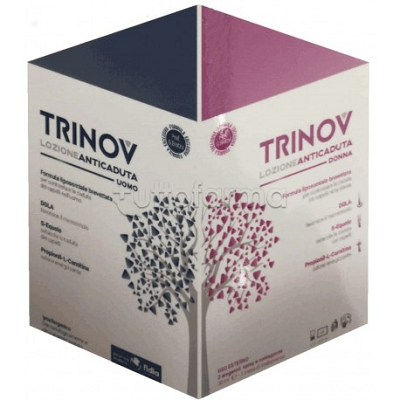Update: October 2, 2019 — Trinov (formerly Brotzu lotion) is now available in lotion as well as shampoo format. The company that makes it now also sells a hair loss supplement. Please make sure to discuss your results and write your reviews of this hair growth product in the comments. Also see this new study on Trinov.
Update: October 4, 2018 — Trinov is finally Released! In Italy, it is known as Trinov lozione anticaduta. The chances of any side effects with this product are minimal.
Trinov is the most hyped hair loss product to come out in many years. The Italian manufacturer Fidia Farmaceutici released this new hair growth treatment around the end of 2018.
The initial product release is planned for Italy. Note that this product was formerly known as the Brotzu lotion. It can be used by both men and women, but is not a cure for hair loss. Just a very rare new and potentially strong treatment.

Trinov (Brotzu Lotion) Purchase Options
However, it seems like Trinov is already being sold online by several companies. I will add more to the below list in the coming weeks.
- Several week ago, reader “hlscc” posted a link to the Trinov sales page on Italian online pharmacy website efarma.com. Current price is 71.25 Euros (slightly discounted from 75 Euros retail price).
- Yesterday, reader “Javier” from Spain e-mailed me a link to Tuttopharma, also based in Italy. They are selling Trinov for 67.50 Euros. Interestingly, they have a photo of the packaging. It looks like a 30ml spray per the title. I was under the impression that it would be a lotion?
- Another new one is Farmacia Sant’ Antonio. The offer worldwide delivery with 48-72 hours.
- Update: Trinovanticaduta official website.

Ingredients and How it Works
After translating into English, the below Trinov ingredients sound encouraging and exactly what we expected. See my past posts on the Brotzu Lotion for more on the science and ingredients behind this product. Especially the original Dr. Brotzu post from February 2016.
- Dhomo-Gamma-Linoleic Acid (DGLA). A precursor of prostaglandin E1 (PGE 1).
- S-Equol. Inhibits 5 alpha-reductase enzyme activity.
- Propionyl-L-Carnitine. Promotes lipid metabolism and stimulates energy production.
Trinov Reviews
If you try out Trinov, make sure to write your reviews in this post’s comments section. I do not intend to try out the product myself until I have read many positive reviews about it over the next 6 months. How do you rate it on a scale of 1-10? Do note that it is not meant to grow hair on totally bald areas of the scalp.
Dr. Brotzu Latest 2019 Interview
The below image is from a recent interview of Dr. Brotzu via Trinovanticaduta’s Youtube channel:
